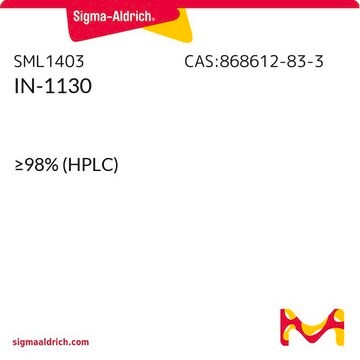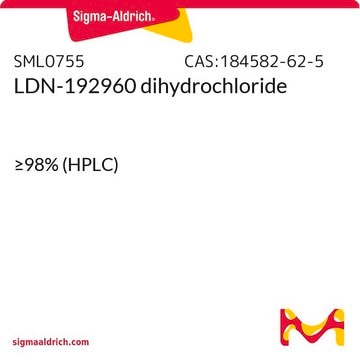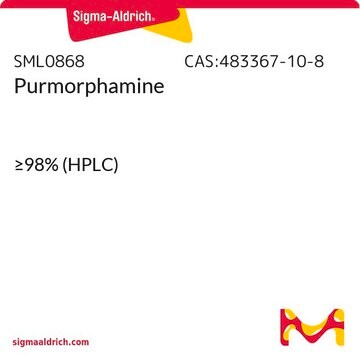SML0559
LDN193189 hydrochloride
≥98% (HPLC), powder, ALK2/3 inhibitor
Synonym(s):
4-[6-[4-(1-Piperazinyl)phenyl]pyrazolo[1,5-a]pyrimidin-3-yl]-quinoline hydrochloride, DM-3189
About This Item
Recommended Products
product name
LDN193189 hydrochloride, ≥98% (HPLC)
Quality Level
Assay
≥98% (HPLC)
form
powder
storage condition
desiccated
color
yellow to orange
solubility
H2O: 5 mg/mL, clear (warmed)
shipped in
wet ice
storage temp.
−20°C
SMILES string
C(C=N1)(C2=CC=C(N3CCNCC3)C=C2)=CN4C1=C(C5=CC=NC6=C5C=CC=C6)C=N4.Cl
InChI
1S/C25H22N6.ClH/c1-2-4-24-22(3-1)21(9-10-27-24)23-16-29-31-17-19(15-28-25(23)31)18-5-7-20(8-6-18)30-13-11-26-12-14-30;/h1-10,15-17,26H,11-14H2;1H
InChI key
PCCDKTWDGDFRME-UHFFFAOYSA-N
Application
Biochem/physiol Actions
Storage Class Code
11 - Combustible Solids
WGK
WGK 3
Flash Point(F)
Not applicable
Flash Point(C)
Not applicable
Certificates of Analysis (COA)
Search for Certificates of Analysis (COA) by entering the products Lot/Batch Number. Lot and Batch Numbers can be found on a product’s label following the words ‘Lot’ or ‘Batch’.
Already Own This Product?
Find documentation for the products that you have recently purchased in the Document Library.
Customers Also Viewed
Our team of scientists has experience in all areas of research including Life Science, Material Science, Chemical Synthesis, Chromatography, Analytical and many others.
Contact Technical Service













